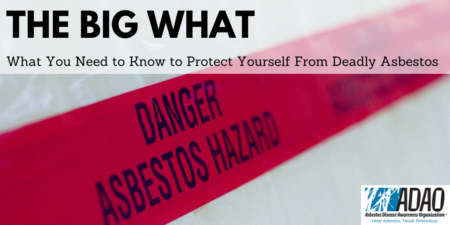Posted on September 30, 2021
While promising research continues, prevention remains the cure.
 Since October is Health Literacy Month, the Asbestos Disease Awareness Organization (ADAO) is taking the opportunity to share information on asbestos disease and prevention. To this day, most Americans do not know that asbestos is currently legal and lethal in our country. They also don’t know that asbestos exposure causes deadly illnesses including mesothelioma, asbestosis, and cancers of the lung, larynx, and ovaries. Over 40,000 Americans die each year from asbestos exposure, and there is no safe level of exposure.
Since October is Health Literacy Month, the Asbestos Disease Awareness Organization (ADAO) is taking the opportunity to share information on asbestos disease and prevention. To this day, most Americans do not know that asbestos is currently legal and lethal in our country. They also don’t know that asbestos exposure causes deadly illnesses including mesothelioma, asbestosis, and cancers of the lung, larynx, and ovaries. Over 40,000 Americans die each year from asbestos exposure, and there is no safe level of exposure.
Unfortunately, our homes, schools, and workplaces are riddled with what is called legacy asbestos: asbestos that was used in construction before the 1970s, and still present in structures etc. Here are the top things you need to know about legacy asbestos to protect yourself and your loved ones from exposure:
What is it, and why does it matter?
- Legacy asbestos is any asbestos that was used in either the construction of buildings or the manufacture and use of products, machinery and equipment, and is now in place in homes, factories and other structures.
- You become exposed to legacy asbestos when the fibers are released into the air and you breathe them in.
- There is also potential for second-hand exposure, which means a family member is exposed when someone brings asbestos into the home on their clothing and family members inhale the fibers.
- Exposures can occur in homes, schools and workplaces during renovations, repairs and demolition of structures; in factories or other places where asbestos-containing machinery and equipment is used; and during explosions, fires, hurricanes, tornadoes, earthquakes and other natural disasters in which asbestos fibers are released to the atmosphere and asbestos-containing debris from collapsing or destroyed structures must be disposed of.
- Firefighters, automotive and construction workers, school teachers and staff are considered among high-risk groups for asbestos-caused diseases because many schools were built with and contained asbestos-containing materials (ACMs) that have become friable (easily release asbestos fibers through normal use) over the years.
So with the knowledge above, what can we do to prevent exposure?
- Do not touch anything you think is asbestos. EPA states that “you can’t tell whether a material contains asbestos simply by looking at it, unless it is labeled. If in doubt, treat the material as if it contains asbestos and leave it alone. A trained and accredited asbestos professional should take samples for analysis, since a professional knows what to look for.”
- Never test, remove or sweep up asbestos yourself. Contact your EPA regional office for a list of licensed asbestos professionals in your area.
- Talk with your physician.! Be sure to share your medical and occupational history, as that provides them with an understanding of potential exposure.
- It’s time to ban asbestos with a bill that includes addressing legacy asbestos. That’s why the Alan Reinstein Ban Asbestos Now Act (ARBAN) would require the National Academy of Sciences (NAS) to conduct a comprehensive study of risks presented by “legacy” asbestos used in millions of residences, businesses, factories, public buildings, and schools around the country. This would allow us to map the threat of potential exposure and deal with it safely.
- The bill would also establish a new Right-to-Know program to require current importers, processors and distributors to report and disclose to the public how much asbestos is in U.S. commerce, where and how it is used, and who is exposed. This is another critical piece of information needed to keep Americans safe.
It is long past time for the United States to ban asbestos and take a hard look at the manmade disaster that is legacy asbestos. We need to pass the Alan Reinstein Ban Asbestos Now (ARBAN) Act and stop all imports and use, require a legacy study, and create a Right-to-Know program. Call your elected officials and urge them to pass this bill today.
Linda Reinstein
